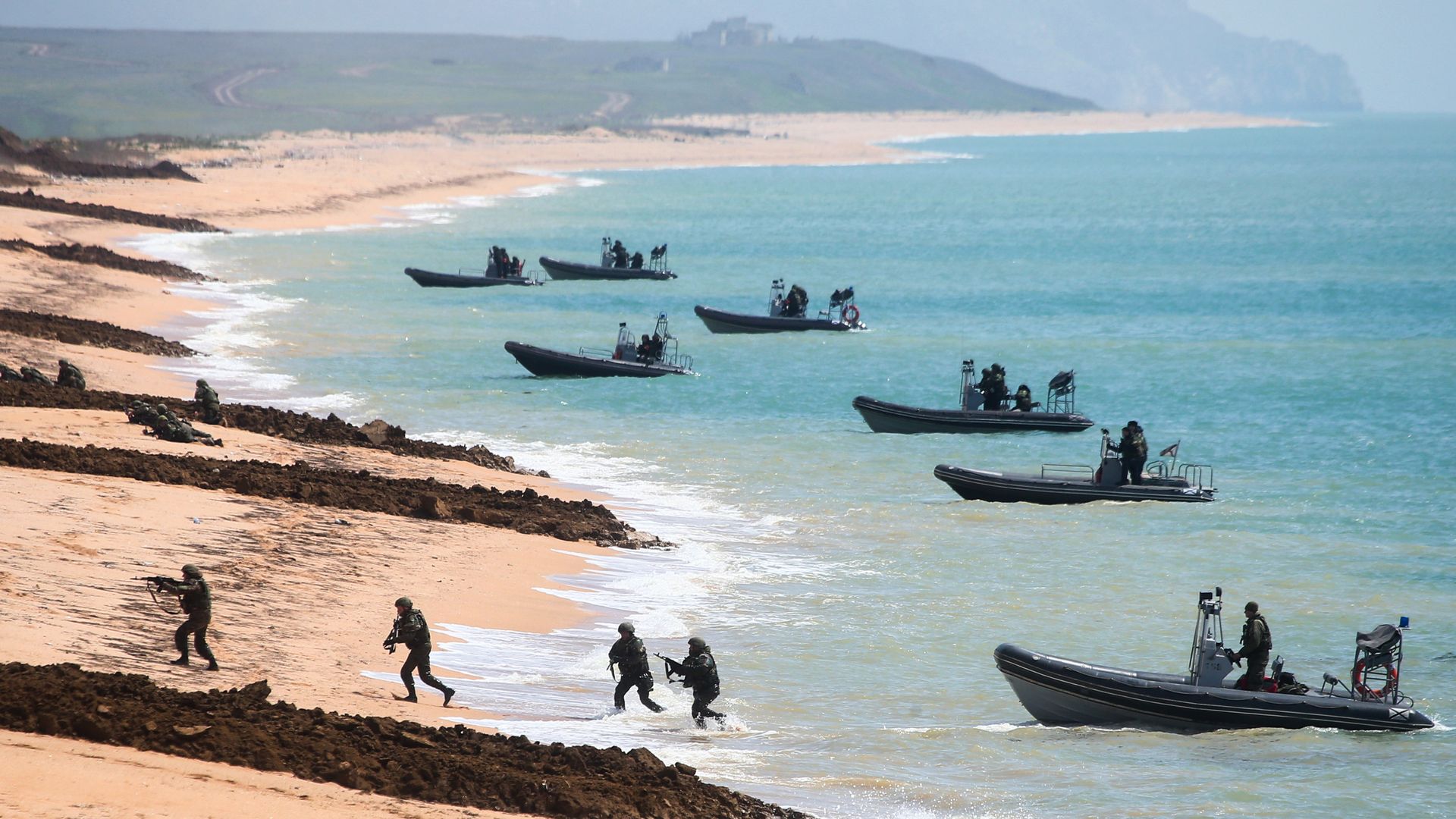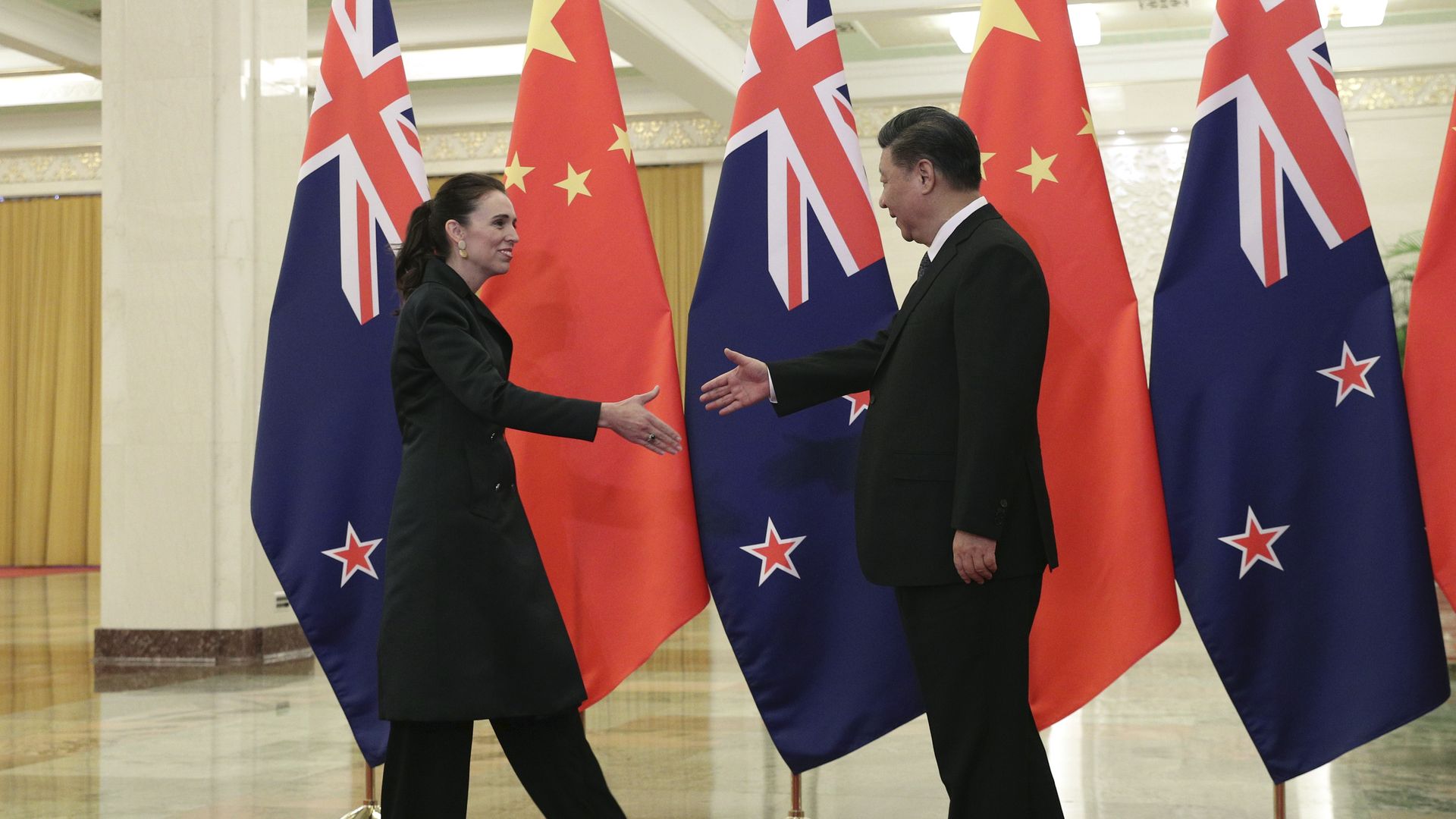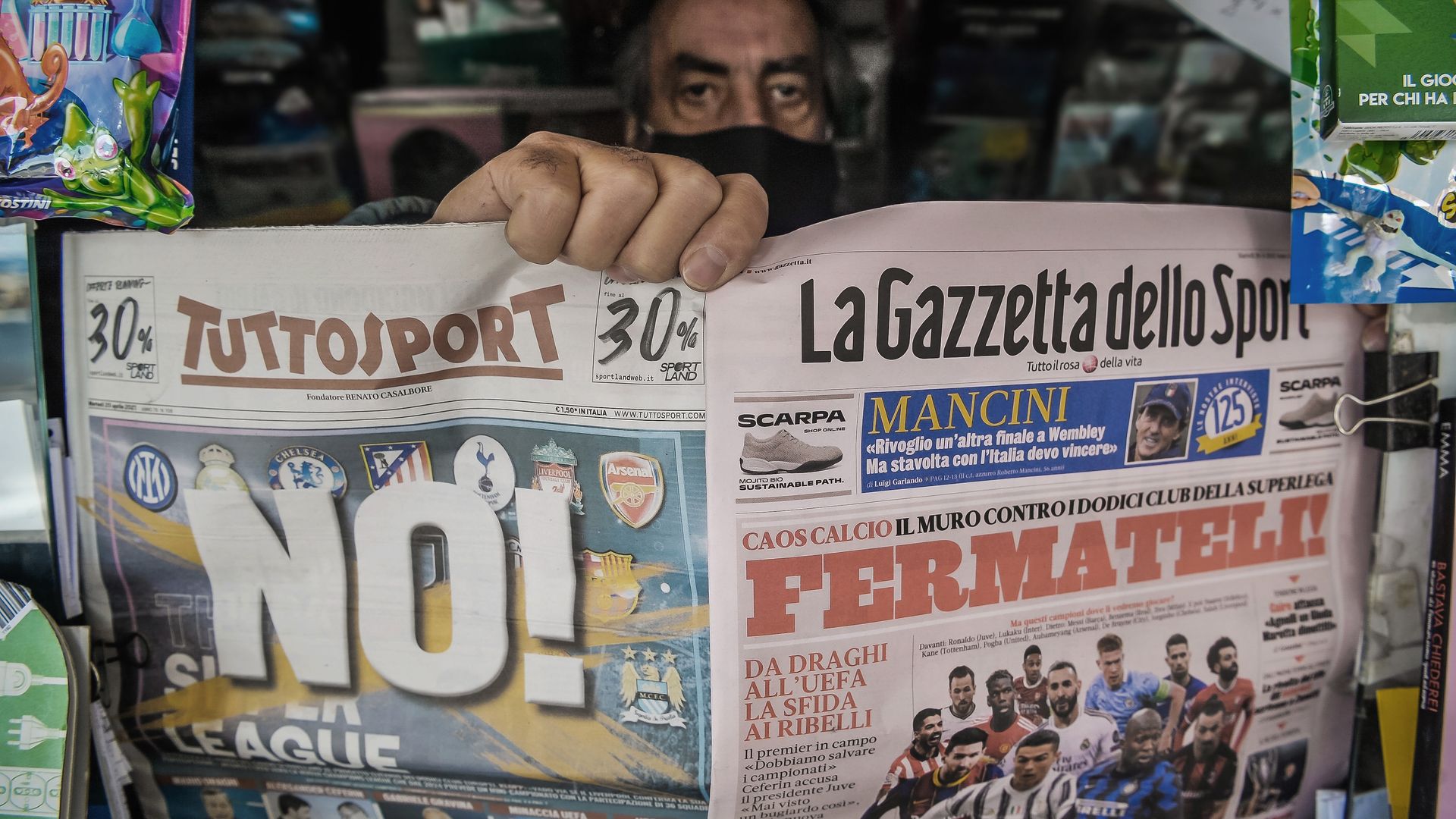| | | | | | | Presented By Blockchain.com | | | | Axios World | | By Dave Lawler ·Apr 22, 2021 | | Welcome back to Axios World. - Well, that was fast. The European Super League is already dead. In the meantime, I found out that quite a number of you are Spurs fans. I always knew I had a discerning readership.
- Tonight's edition (1,587 words, 6 minutes) takes off from Ukraine, with stops in Chad, New Zealand and more.
Heads up: ♻️ We're launching our latest Get Smart video short course series on climate tech. Sign up here. | | | | | | 1 big thing: All quiet on Ukraine's eastern front |  | | | Russian military exercises today in Crimea. Photo: Sergei Malgavko\TASS via Getty | | | | Just as the threat of a Russian invasion seemed to be looming largest, Russia's defense minister announced today that the troops that had massed on Ukraine's borders would be heading back to their barracks by May 1. Driving the news: Some 80,000 troops and heavy military equipment had been moved over the last month to occupied Crimea and to Ukraine's eastern borders. - Russian military drills involving more than 60 ships, 10,000 troops, 200 aircraft and 1,200 military vehicles continued through Thursday, per AP.
- Ukrainians anxiously watched Vladimir Putin's annual address on Wednesday to see if he'd announce a military offensive.
- Instead, Ukraine hardly featured in Putin's address. Then came word from Defense Minister Sergei Shoigu that the military exercises would now conclude.
- Ukrainian President Volodymyr Zelensky welcomed the news, though he said Ukraine would remain "vigilant."
The big picture: The Russian buildup appears to have been engineered in part to gauge the response not only of Ukraine, but of the U.S. and Europe. - President Biden offered warnings to Putin and support to Zelensky, but backed off a plan to send warships to the Black Sea and made clear that the U.S. would not fight a war over Ukraine.
- The European response was more limited still, though German Chancellor Angela Merkel and French President Emmanuel Macron spoke several times with Putin. Biden also proposed a summit with Putin to discuss Ukraine and other issues.
- In Ukraine, though, the threat of invasion sparked a sense of national unity and bolstered Zelensky's position, Davyd Arakhamia, the leader of Zelensky's party in parliament, told Axios in an interview on Wednesday.
What he's saying: "When it's a peaceful situation, people start to play political games," Arakhamia said. "But when we see the external enemy is coming, and there is no discussion about who is the enemy, people are united." "Putin has an art to unite the Ukrainian people. He did it in 2014. He's done it again right now." — Davyd Arakhamia "Of course we were expecting a more active role," Arakhamia says of Biden's response, "but we accept the fact that the U.S. doesn't want to make the discussion [with Putin] even tougher, so they postponed these warships. We're considering this a part of the geopolitical situation right now." - "All the countries are afraid of direct war with Russia," he continues. "We understand the situation. It's our duty to stand up, but of course we'd like to receive as much assistance as possible, both politically and economically and militarily."
Arakhamia was leading the coordination between parliament and Zelensky over military preparations. - Putin's precise intentions were "a mystery," so the Ukrainians had to prepare to defend against Russian operations at sea, from Crimea and from Donbas in the east — all while knowing that Russia had the far superior military.
The bottom line: "If you asked people 15 years ago, 10 years ago, 'Would it even be a possible discussion that a war between Russia and Ukraine could happen,' people would call you crazy." - "And now we are seriously considering this scenario and preparing for this."
Go deeper: Leaked Ukraine memo reveals scope of Russia's aggression |     | | | | | | 2. Africa: Slain strongman Déby replaced by his son |  | | | Mahamat Idriss Déby (front left) announced as the transitional leader. Photo: Chadian Presidency Handout via Getty | | | | Mahamat Idriss Déby is set to replace his father Idriss Déby, who ruled Chad for 30 years before being killed on Tuesday while on the front lines with forces attempting to repel a rebel advance. Why it matters: The younger Déby, 39, has been named the head of a military council that is to take power for 18 months, during which time the constitution will be suspended. - Power should have passed to the parliamentary speaker, but he deferred in favor of the military.
- The opposition has decried what it sees as a coup. A powerful general has also spoken out, saying he represents many in the armed forces.
- But France has defended the unorthodox transition in a country that has served as a critical counterterrorism partner in the Sahel. President Emmanuel Macron will attend the elder Déby's funeral on Friday.
The state of play: The circumstances of Déby's death remain unclear. Meanwhile residents of the capital are preparing to flee as fighting continues between the military and the rebels, DW reports. |     | | | | | | 3. Oceania: Australia and New Zealand diverge on China |  | | | New Zealand Prime Minister Jacinda Ardern meets with China's Xi Jinping in 2019. Photo: Kenzaburo Fukuhara - Pool via Getty | | | | Australia's federal government has ripped up two agreements the state of Victoria signed as part of China's Belt and Road Initiative, citing the "national interest in a free and open Indo-Pacific." Why it matters: Australia is showing increased willingness to risk backlash from China — by far its largest trading partner. Beijing swiftly accused Canberra of showing a "Cold War mentality and ideological bias." The other side: Foreign Minister Nanaia Mahuta of New Zealand this week tried to draw a line between her country and its Five Eyes partners — Australia, Canada, the U.K., and U.S. — when it comes to China. - New Zealand is "uncomfortable with expanding the remit" of the intelligence partnership and seeks an "independent" foreign policy, she said.
What they're saying: - After those comments caused a stir, Prime Minister Jacinda Ardern stated her commitment to Five Eyes while adding, "It's all about making sure we're partnering or speaking with the right cohort at the right time."
- New Zealand has declined to join in multiple joint statements that criticized China, though the government has at times raised concerns about China's human rights record.
- Former Australian foreign minister Alexander Downer noted that New Zealand had also strengthened its trade pact with China earlier this year while Australia was facing Chinese sanctions. "Used to be our best mates. Not now," he tweeted.
The big picture: The new factor here is not that New Zealand is moving closer to Beijing, it's that countries like Australia are moving further away, Axios China reporter Bethany Allen-Ebrahimian notes. - Flashback: After Australia called for an investigation into the origins of COVID-19 last year, China struck back by slapping tariffs on Australian exports of products like lobster and wine.
|     | | | | | | A message from Blockchain.com | | Worried you missed the boat on Bitcoin? It's not too late | | |  | | | | Blockchain.com allows you to buy, sell, trade, swap and earn cryptocurrencies like Bitcoin. The background: With over 70M Wallets in 200 countries, Blockchain.com is trusted by millions of people to trade, store and use crypto. So, what are you waiting for? | | | | | | 4. Data du jour: Press freedom around the world |  Data: Reporters Without Borders; Chart: Axios Visuals Journalism is seriously impeded in 132 of 180 countries included in Reporters without Borders' annual Press Freedom Index — a particularly dangerous state of affairs during the pandemic. Breaking it down: Nordic countries dominate the top of the list as the most free, while China, Turkmenistan, North Korea and Eritrea are at the bottom. The U.S. is ranked 44th. - Brazil has fallen into the second-lowest category amid a campaign of "orchestrated public humiliation of journalists" by allies of President Jaír Bolsonaro. Malaysia fell even further due to a new "anti-fake news" decree.
- Burundi, Sierra Leone and Mali saw some of the largest improvements.
- The worst region for press freedom remains the Middle East and North Africa.
See the interactive chart. |     | | | | | | 5. Global news roundup: Acknowledging the Armenian genocide |  | | | A rally in Los Angeles to mark the anniversary of the genocide. Photo: Mario Tama/Getty Images | | | | 1. Biden will reportedly become the first U.S. president to acknowledge that the Ottoman Empire committed genocide against Armenians in 1915 in a statement on Saturday. - That would fulfill a campaign pledge but spark outrage from Turkey, which has been warning Biden against it.
- Flashback: Barack Obama reneged on a similar pledge.
2. During this week's nuclear talks in Vienna, the U.S. provided Iran with an outline of the sanctions it was prepared to remove as part of a mutual return to full compliance with the 2015 nuclear deal, a senior State Department official told reporters on Wednesday. - Why it matters: Iran has thus far demanded that the roughly 1,500 sanctions imposed by the Trump administration all be lifted, but the Biden administration says that's a non-starter.
- What's next: The State Department official said there's a long way to go, but didn't rule out the possibility of getting a deal by mid-May.
- Go deeper: U.S.-Israel tensions build as Iran talks progress
3. Politico's Nahal Toosi got a list of the ambassadorial posts that are expected to go to Foreign Service officers rather than political appointees. - It's "slim pickings" says Brett Bruen, a former diplomat and now president of the Global Situation Room, noting that just 4 of 30 European posts will go to career diplomats.
- "To say there is deep disappointment amongst career diplomats would not do justice to the sense of outrage I've heard expressed," Bruen told Axios.
4. Russian authorities arrested some 1,800 protesters who came out on Wednesday to show support for Alexei Navalny, who is in grave health after undertaking a hunger strike in prison. 5. India continues to record the highest single-day caseloads anywhere in the world during the pandemic. Oxygen and other supplies are running short in cities. 6. Prime Minister Jean Castex said today that the peak of France's third wave "appears to be behind us." Vaccination rates are also rising steadily around the EU. Go deeper: J&J rollout resumes in EU |     | | | | | | 6. Climate conference | | Biden's two-day climate summit kicked off today, with 40 world leaders participating, including China's Xi Jinping, who only RSVP'd at the last minute. Several leaders arrived with new commitments: - Biden said the U.S. would seek to cut greenhouse gas emissions by 50%-52% by 2030 relative to 2005 levels, roughly twice as ambitious as the previous target set during the Obama administration.
- Prime Minister Justin Trudeau said Canada would increase its target for reducing greenhouse gas emissions to 40%-45% of its 2005 levels by 2030 and achieve net-zero emissions by 2050.
- Prime Minister Yoshihide Suga said Japan would cut its emissions by 46% from 2013 levels by 2030 and achieve net-zero by 2050.
- President Moon Jae-in said South Korea will end all new public financing for overseas coal projects.
- President Jaír Bolsonaro of Brazil pledged to end illegal deforestation by 2030 and achieve carbon neutrality by 2050.
- He's also seeking billions in international funds to pay for conservation initiatives in the Amazon.
Xi said China would attempt to "strictly limit increasing coal consumption" over the next five years.  Reproduced from IEA; Chart: Axios Visuals Where things stand: |     | | | | | | 7. Stories we're watching |  | | | Reading up on the European Super League (RIP) in Livorno, Italy. Photo: Laura Lezza/Getty Images | | | - Marshall Plan for Central America
- U.K. Parliament declares China's treatment of Uyghurs "genocide"
- House votes to limit arms sales to Saudi Arabia
- EU proposes new rules for artificial intelligence
- Abbas weighs delay of Palestinian elections
- German conservatives back Laschet
- Taking a knee, other protests banned at Tokyo Olympics
Quoted: "Nothing wrong with bunny hugging, but you know what I'm driving at friends and colleagues." — U.K. Prime Minister Boris Johnson at Biden's climate summit, arguing that acknowledging the threat from climate change was not a matter of "political correctness." |     | | | | | | A message from Blockchain.com | | Worried you missed the boat on Bitcoin? It's not too late | | |  | | | | Blockchain.com allows you to buy, sell, trade, swap and earn cryptocurrencies like Bitcoin. The background: With over 70M Wallets in 200 countries, Blockchain.com is trusted by millions of people to trade, store and use crypto. So, what are you waiting for? | | | | | | Axios thanks our partners for supporting our newsletters.
Sponsorship has no influence on editorial content. Axios, 3100 Clarendon Blvd, Suite 1300, Arlington VA 22201 | | | You received this email because you signed up for newsletters from Axios.
Change your preferences or unsubscribe here. | | | Was this email forwarded to you?
Sign up now to get Axios in your inbox. | | | | Follow Axios on social media:    | | | | | |










No comments:
Post a Comment